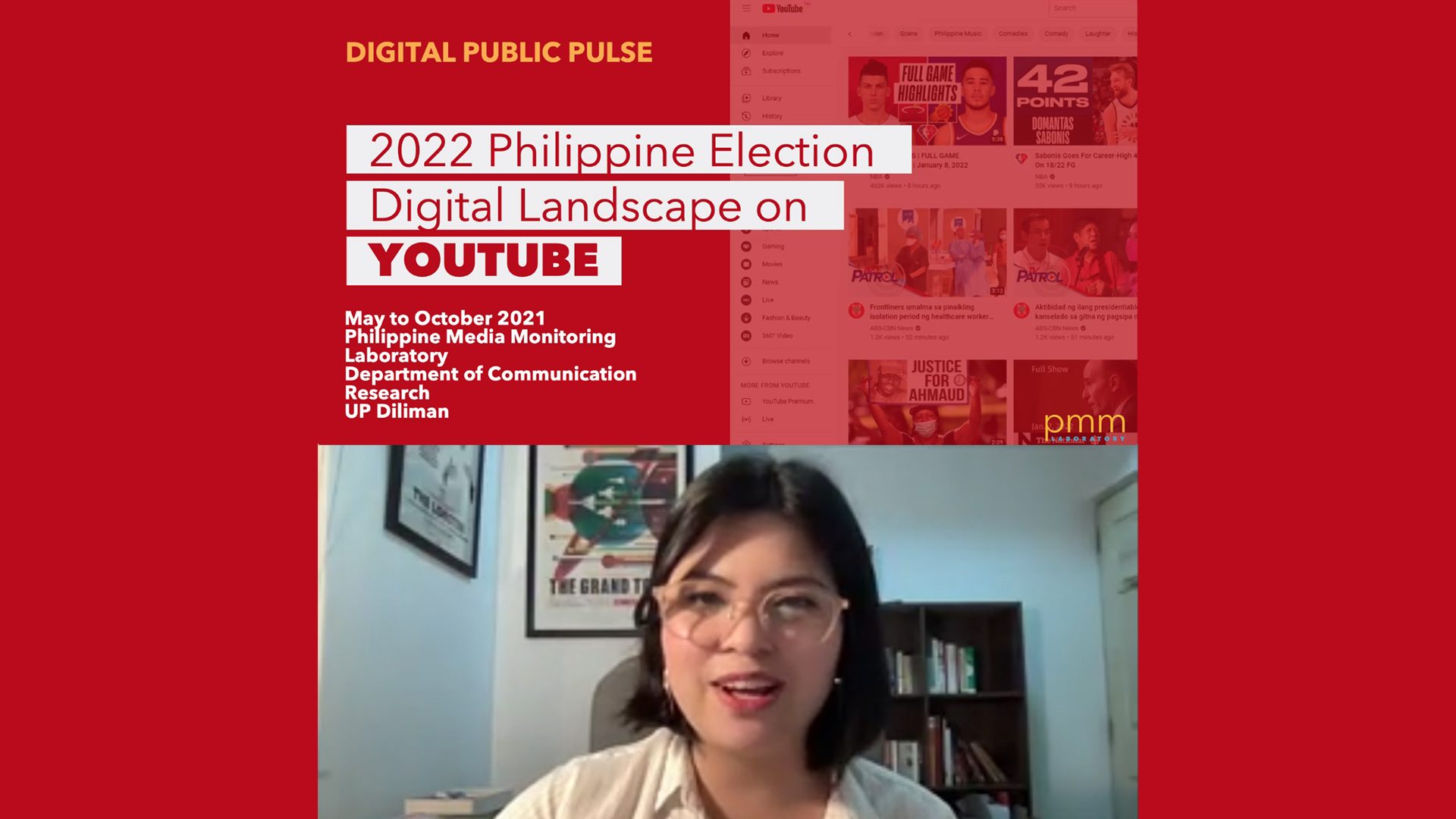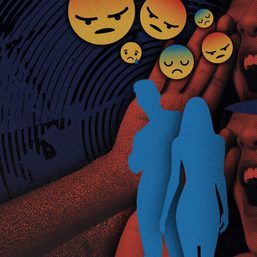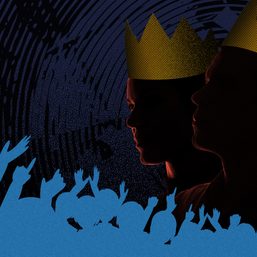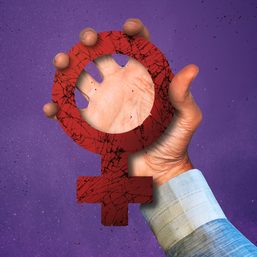SUMMARY
This is AI generated summarization, which may have errors. For context, always refer to the full article.

MANILA, Philippines – A study found that YouTube channels owned by or aligned with presidential aspirant Ferdinand “Bongbong” Marcos Jr. are rising in influence in YouTube discourse on the upcoming 2022 elections, based on data collected until October 2021.
The first report of the Digital Public Pulse (DPP) project, a study conducted by the Philippine Media Monitoring Laboratory, was presented on Wednesday, January 12, showing their findings on election-related networks, issues, and practices on YouTube. The project is co-led by Marie Fatima Gaw and Jon Benedik Bunquin, assistant professors at the University of the Philippines College of Mass Communication Department of Communication Research.
They found that from August to October 2021, mainstream news media comprised the biggest cluster of YouTube election actors at 27.72% of the network. Meanwhile, Marcos-related channels were spread across at least three clusters:
- President Rodrigo Duterte/Marcos-aligned media sources and hyperpartisan channels (14%)
- Marcos’ own channel and algorithmically-linked media personalities and hyperpartisan channels (13.01%)
- Marcos/Sara Duterte-aligned hyperpartisan content creators (11.23%).
The Rodrigo Duterte/Marcos cluster also covered Duterte-allied channels that criticized and disparaged Marcos.
The DPP report also found that other presidential aspirants are gaining influence. In particular, they mentioned Isko Moreno, through entertainment, and Senator Manny Pacquiao “from sports to politics.” Meanwhile, they said, Vice President Leni Robredo and Senator Ping Lacson remain as “minimal players.”
The researchers conducted network analyses on quarterly datasets of a total of 2,057 related and recommended YouTube channels and their videos from May to October 2021, collected from a selection of election-related keywords. The channels were coded into actor categories based on their “organizational affiliations, political interests, and content genres.”
The study looked at three measures of influence, namely identifying channels that are most recommended in the network, those that are most relevant to election keywords, and those that function as bridges from one group of videos to another.
They found that the most recommended and most prominent actor remains to be news media, followed by politicians and government offices, and then YouTube channels that categorize themselves under “news and politics.”
From August 31 to October 31 or Quarter 2 of the study, Marcos and his connected hyperpartisan channels and influencers were found to be rising in influence.
Based on degree centrality or the measure of channels that are most recommended, the top actors they found under YouTube “news and politics” channels include Showbiz Fanaticz – which Rappler has fact-checked at least 41 times – and Filipino Future, which has a track record of posting false Marcos-related content on YouTube and Facebook.
Declining influence of media on YouTube
Researchers also found that leading politician and government channels – the likes of Bongbong Marcos, Team Pacquiao, and RTVMalacanang – directly reach their audiences without the mediation of the press.
While “mainstream professional media” was found to be the largest community of actors in both quarters, researchers said they were increasingly detached from other clusters in the network, thus “weakening their influence over particular audiences.”
“It doesn’t mean that you won’t see news media content, but because of the personalization algorithm of YouTube, once you move away from those channels, it’s possible that you have minimal exposure to professional media content,” Gaw said.
Separate research by Gaw and De La Salle University communication professor Cheryll Ruth Soriano also found that the YouTube algorithm recommends videos on the Marcos family and Martial Law era that are mostly uploaded by amateur content creators, with news, institutional sources, and academic sources rarely appearing in the search. (READ: YouTube networks spread propaganda on Marcoses, Martial Law – study)
The DPP report also stated that “news media” is an “increasingly ambiguous genre” that political actors can use to manipulate voters.
Rappler earlier found that some channels that are known for posting false and/or misleading information label themselves as channels for celebrity or trending news, even when they mostly publish political content. (READ: Red flag for 2022: Political lies go unchecked on YouTube showbiz channels)
‘Cloaked campaigning’
One practice that the researchers observed was that influencers and content creators conduct kalye (street) surveys and produce videos amplifying on-ground campaigns of the Marcoses. The kalye surveys are conducted in different barangays, provinces, and even cities abroad, claiming that Marcos has “landslide” and “solid” support.
Gaw also cited algorithmic “community” building as the new form of microtargeting, where viewers are “called into” associating themselves with a particular political agenda or identity.
How do these factor in the guidelines for election campaigns in the 2022 polls?
The Commission on Elections (Comelec) has banned microtargeting – analyzing a person’s online usage to serve them ads according to their preferences – of voters in the 2022 elections.
Meanwhile, paid digital influencers and online content creators who advocate for or against a candidate on their platforms are obliged to report to Comelec the payments for their online posts.
But organic community support and paid political campaigns on YouTube are indistinguishable from one another, the report found.
“Apart from resource-rich candidates skewing the playing field to their advantage, this kind of cloaked campaigning might manipulate the perception of public support for candidates and even create a lopsided view of our political reality,” Gaw said.
Gaw also said, “Politicians are also forced to engage with YouTubers because the recent policy of YouTube to disallow political ads, and this essentially makes the campaigning more stealthy and hidden from election regulation and public scrutiny. So together, this creates the perfect storm for hyperpartisanship and platforms might be complicit to the deteriorating state of our democracy.” – Rappler.com
Add a comment
How does this make you feel?



![[ANALYSIS] Cybermisogyny violates human rights](https://www.rappler.com/tachyon/2022/06/Cyber-misogyny-human-rights.jpeg?resize=257%2C257&crop_strategy=attention)
![[ANALYSIS] Building Narratives: stories of greatness and windmills in Marcos Jr.’s campaign video](https://www.rappler.com/tachyon/2022/05/Narratives-marcos-windmills-May-18-2022.jpg?resize=257%2C257&crop_strategy=attention)




![[New School] Tama na kayo](https://www.rappler.com/tachyon/2024/02/new-school-tama-na-kayo-feb-6-2024.jpg?resize=257%2C257&crop=290px%2C0px%2C720px%2C720px)
![[DECODED] The Philippines and Brazil have a lot in common. Online toxicity is one.](https://www.rappler.com/tachyon/2024/07/misogyny-tech-carousel-revised-decoded-july-2024.jpg?resize=257%2C257&crop_strategy=attention)




There are no comments yet. Add your comment to start the conversation.